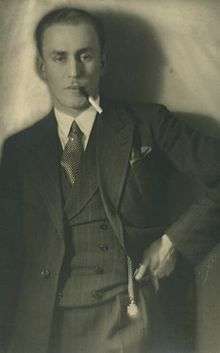Olavi Paavolainen
Olavi Paavolainen (17 September 1903 – 19 July 1964) was a Finnish writer, essayist and poet. He was one of the prominent figures of the literary group Tulenkantajat (″The Flame Bearers″), and one of the most influential Finnish writers of the inter-war period.[1][2]
Olavi Paavolainen | |
|---|---|
 Olavi Paavolainen in 1928 | |
| Born | 17 September 1903 |
| Died | 19 July 1964 (aged 60) Helsinki, Finland |
| Occupation | writer, poet, essayist |
| Years active | 1919–1964 |
Paavolainen was interested in Fascism and National Socialism, but after the World War II he turned to the political left. Paavolainen's notable works include the 1936 travel report Kolmannen valtakunnan vieraana (″A Guest of the Third Reich″) and the 1946 Synkkä yksinpuhelu (″A Gloomy Soliloquy″), based on his war diaries.[2]
Paavolainen was bisexual.[3] In the 1930s, he had a long relationship with the writer Helvi Hämäläinen. In 1945–1953 Paavolainen was married with the actress Sirkka-Liisa Virtamo. After the divorce he was in a relationship with the communist leader Hertta Kuusinen.[1]
Awards
- Eino Leino Prize 1960
Works
- Nuoret runoilijat, 1924 (anthology)
- Valtatiet, 1928 (together with Mika Waltari)
- Nykyaikaa etsimässä, 1929
- Keulakuvat, 1932
- Suursiivous eli kirjallisessa lastenkamarissa, 1932
- Kolmannen valtakunnan vieraana, 1936
- Lähtö ja loitsu, 1937
- Risti ja hakaristi, 1938
- Synkkä yksinpuhelu, 1946
References
| Wikimedia Commons has media related to Olavi Paavolainen. |
- "Olavi Paavolainen". 375 Humanists. University of Helsinki Faculty of Arts. 29 September 2015. Retrieved 22 January 2019.
- Toikka, Pekka (13 August 2008). "Kesäklassikko: Biseksuaali kareliaani sodassa" (in Finnish). Killtomato. Retrieved 22 January 2019.